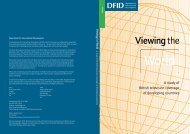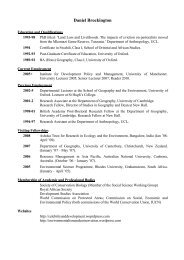The World Online How UK citizens use the internet to find out about ...
The World Online How UK citizens use the internet to find out about ...
The World Online How UK citizens use the internet to find out about ...
- No tags were found...
Create successful ePaper yourself
Turn your PDF publications into a flip-book with our unique Google optimized e-Paper software.
Figure 3: DFID and Poverty.com mapsIllustrating a sense of place and people: maps and s<strong>to</strong>riesMaps immediately provide a sense of scale and geography. <strong>The</strong>yare also innately intriguing and encourage fur<strong>the</strong>r exploration. Mostrespondents had little idea where developing countries were andmaps provided <strong>the</strong>m with a context that allowed <strong>the</strong>m <strong>to</strong> relatecountries <strong>to</strong> where <strong>the</strong>y’d been or which <strong>the</strong>y knew ab<strong>out</strong>.<strong>The</strong> Poverty.com map with its personal s<strong>to</strong>ries tied <strong>to</strong> geographywas immediately emotive in terms of both scale and s<strong>to</strong>ry.Respondents reported being drawn <strong>to</strong> clicking on <strong>the</strong> images <strong>to</strong><strong>find</strong> <strong>out</strong> more ab<strong>out</strong> <strong>the</strong> people. <strong>How</strong>ever, on discovering thatpho<strong>to</strong>s and s<strong>to</strong>ries were composites, respondents felt misled.Seeing it for yourselves: filmFilm is highly effective in engaging an audience in a s<strong>to</strong>ryand in getting across a common humanity or telling a projectsuccess s<strong>to</strong>ry. One respondent recalled “I found a link <strong>to</strong> areally interesting YouTube video ab<strong>out</strong> how bad it was in <strong>the</strong>Maldives, just ab<strong>out</strong> people living on a dollar a day. It was sogood I tweeted ab<strong>out</strong> it. It could have been a set-up but it wasdone as an amateur video and it was how it was reported. It wasjust information from a real person” (Interested Mainstream)<strong>How</strong>ever, although films were often effective once watched,getting respondents <strong>to</strong> watch <strong>the</strong>m in <strong>the</strong> first place was <strong>the</strong>bigger challenge. In general, only <strong>the</strong> most engaged said <strong>the</strong>ywould watch a film on <strong>the</strong>se issues. For <strong>the</strong> majority, a film wasa step <strong>to</strong>o far in terms of commitment – <strong>the</strong>re were <strong>to</strong>o mayunknowns at play such as how long it would be or how interesting.As one respondent said “I think with videos it’s a time issue,you can’t skim read a video, you can’t skip through it and pick<strong>out</strong> a key word” (Young Person, 19-21). With such low patiencelevels, it’s important that films are immediately engaging.Government sites as a source of informationIn general, respondents did not think of visiting governmentwebsites even if <strong>the</strong>ir search was related <strong>to</strong> government aid.Directgov and DFID emerged via some Google searches, withDirectgov more likely <strong>to</strong> be accessed first as it was <strong>the</strong> onlygovernment site which people were aware of. Respondentsreported being surprised that Directgov didn’t have any informationon international aid, as <strong>the</strong>y had little idea where else <strong>the</strong>ymight <strong>find</strong> it. Nei<strong>the</strong>r site necessarily appeared near <strong>the</strong> <strong>to</strong>pof search pages even if <strong>the</strong> key words ‘government’ and ‘aid’were typed in, which meant that DFID in particular was oftenmissed. As one respondent said “I couldn’t believe I couldn’tjust go on<strong>to</strong> a government website with a question ab<strong>out</strong> howmuch <strong>the</strong> <strong>UK</strong> gives <strong>to</strong> Africa. I would have thought that was quitean easy question <strong>to</strong> answer somewhere” (Active Enthusiast)<strong>How</strong>ever, for those who did access <strong>the</strong> DFID site, responses werepositive. One of <strong>the</strong> key strengths of <strong>the</strong> site was that it didn’t feellike a government site. Where government sites were expected <strong>to</strong> bestaid, serious and boring, this was regarded as fresh, engaging andmodern. In addition, government and politics were often regarded asintertwined and <strong>the</strong>refore any government site immediately engenderedscepticism. <strong>How</strong>ever, this site was felt <strong>to</strong> be well designed and provideda sense of scale and expertise. As one teenager said “it was actuallyquite a decent website, it wasn’t boring and everything was easy <strong>to</strong>search <strong>out</strong> – like it had a sidebar which had all <strong>the</strong> recent news andFigure 4: PLAN and Fairtrade films<strong>The</strong> <strong>World</strong> <strong>Online</strong> <strong>How</strong> <strong>UK</strong> Citizens <strong>use</strong> <strong>the</strong> <strong>internet</strong> <strong>to</strong> <strong>find</strong> <strong>out</strong> ab<strong>out</strong> <strong>the</strong> wider world10





